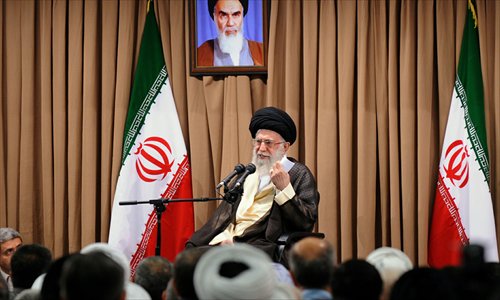HOME >> WORLD
Khamenei rules out freezing sensitive nuclear work for long period
Source:Reuters Published: 2015-6-25 0:23:01

A handout photo provided by the office of Iran's supreme leader, Ayatollah Ali Khamenei, shows him addressing Iran's top officials during a meeting in Tehran in which he restated his country's red lines for a nuclear deal with world powers on Tuesday. Photo: AFP
Iran's Supreme Leader Ayatollah Ali Khamenei on Tuesday ruled out freezing sensitive nuclear work in the country for a long time and said sanctions imposed on it should be lifted as soon it reaches a final deal with major powers, state TV reported.The six - Britain, France, Germany, China, Russia and the United States - want Iran to commit to a verifiable halt of at least 10 years on sensitive nuclear development work as part of a landmark atomic deal they aim to reach by June 30.
They are offering in exchange relief from sanctions that have crippled the oil exporter's economy.
"Freezing Iran's Research and Development [R&D] for a long time like 10 or 12 years is not acceptable," Khamenei said in a speech broadcast live.
Disputes over how much transparency Iran should offer to ease worries that it has sought to develop nuclear arms, and the timing and pace of relief from sanctions imposed on Tehran, have been major sticking points in negotiations.
"All financial and economic sanctions imposed by the UN Security Council, the US Congress or the US government should be lifted immediately when we sign a nuclear agreement," Khamenei said.
The UN International Atomic Energy Agency (IAEA) has been trying to investigate Western allegations that Iran has been working on designing a nuclear warhead. Iran says that its nuclear program is solely for peaceful purposes and that it is working with the IAEA to clear up any suspicions.
Khamenei voiced trust in Iran's negotiating team but, echoing hard-line Iranian military commanders, also ruled out international access to Iran's military sites.
"Inspection of our military sites is out of the question and is one of our red lines," he said.
UN inspectors regularly monitor Iran's declared nuclear facilities, but the IAEA has complained of a lack of access to sites, equipment, documents and people relevant to its probe.
Posted in: Mid-East